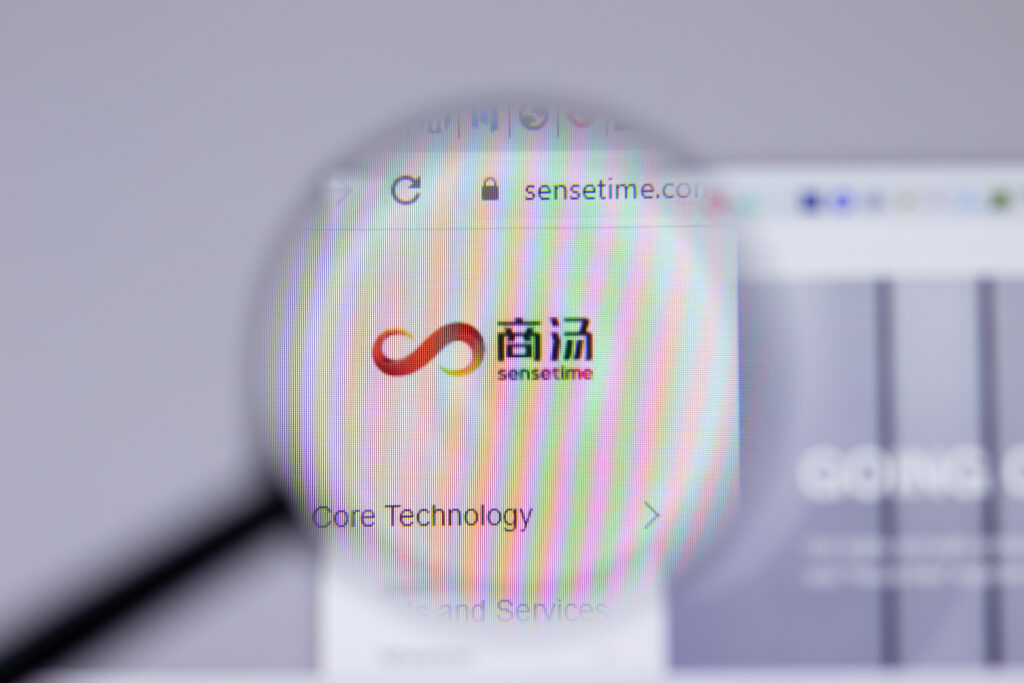In this research note we examine the ups and downs of Chinese artificial intelligence (AI) giant, SenseTime, during their turbulent first year as a publicly traded company. Founded in 2014 by computer scientists, SenseTime specializes in AI-powered software that analyzes images, including faces, and competes directly with Megvii Technology, backed by the Alibaba Group, which is also an investor in SenseTime.
SenseTime is now China's most valuable AI firm. Like China’s older tech giants Huawei and SMIC, the company is regarded as a national champion for its leadership in an emerging field that is considered key to establishing China's tech credentials globally. However, like Huawei and SMIC, SenseTime has also been one of the high-profile targets of sanctions from the US.
SenseTime eventually completed its IPO at the end of December 2021 after the original share-sale schedule was derailed after a move by the US Treasury Department to sanction the company for its alleged role in creating facial-recognition software used in the oppression of Uighur Muslims in the Xinjiang autonomous region of western China. An allegation that the company denies.
Nevertheless, the company pushed ahead with the listing, securing $512 million from nine cornerstone investors including the state-backed Mixed-Ownership Reform Fund and Shanghai Xuhui Capital Investment Co. Notably, SenseTime excluded US investors from the issuance, citing the “the dynamic and evolving nature of the relevant U.S. regulations.”
The stock gained as much as 23% in early trading before ending 7.3% higher, the biggest first-day gain since mid-July for any Hong Kong IPO that raised at least $500 million. The SoftBank Group Corp.-backed company raised HKD 5.78 billion ($741 million) selling 1.5 billion shares at HKD 3.85 ($0.49) apiece, the bottom of its marketed range. Such a strong debut performance is a rare feat in Hong Kong these days, where new listings have been among the worst performers this year.
“Today’s price jump is because of the reasonable valuation, and investors want to buy in this famous company to make money in one or two days as there are no hot themes in the market at present,” said Gary Ching, vice president at Guosen Securities (HK). “But the trend won’t continue as the company still faces a lot of bad news.”
The 2021 annual report, released in March 2022, showed total revenue reached RMB 4.70 billion ($645 million), an increase of 36.4% year-on-year from RMB 3.45 billion ($474 million) in 2020, with a full-year gross profit margin standing at 69.7%. The company divides its activity into four segments; Smart Business, Smart City, Smart Life, and Smart Auto.
The Smart Business segment encompasses AI applications that enable digitalized and automated production activities, space operation and process management protocols. 2021 revenue from the segment reached RMB 1.96 billion ($270 million), an increase of 31.8% year-on-year. Increasing its customer base by 8.7% and its revenue per customer by 21.3% year-on-year.
The firm’s smart city segment is centered around its AI SenseFoundry, a future-oriented digital management platform that tackles structural analysis of massive data in urban environments. Revenue from the Smart City segment reached RMB 2.14 billion ($295 million), representing an increase of 56.5% year-on-year and giving SenseTime the biggest market share of computer vision software for smart cities in China.

The Smart Life segment empowers consumer-facing enterprises with AI capabilities and reached revenues of RMB 415 million ($57 million) in 2021. At the time of its IPO, more than 1.5 billion smartphones were installed with SenseTime’s SDKs. While the Smart Auto segment continues steadily towards its long-term autonomous diving goals, delivering revenues of RMB 184 million ($25 million) in 2021, representing a year-on-year increase of 16.3%.
SenseTime made cumulative R&D investments of over RMB8 billion in the four years leading up to the IPO, and 2021 R&D investment stood at RMB3.06 billion ($420 million), representing 65.1% of the company’s revenue. The success of the firm’s R&D investment is underlined by its patent portfolio. As of the end of 2021, it had 11,494 global patent assets, an 96% increase compared to 2020, among which, 78% were invention patents.
“In the first half of 2022, our Smart Auto and Smart Life segments achieved significant growth,” reads the company’s mid-year interim report. “Although our Smart City and Smart Business segments were impacted by the pandemic, resulting in projects delay and deferred revenue recognition, we have a relatively high-quality customer base that consists of large enterprises and cities, which demonstrated even greater needs for digitization under the pandemic, while rapid recoveries in related industries have started since June.”
For the six months ended June 30, 2022, the Group’s total revenue was RMB 1.42 billion ($195 million), the gross profit was RMB 0.93 billion ($128 million), with gross profit margin of 66.0%. In these first six-months since the IPO, SenseTime invested RMB 1.88 billion ($258 million) in research and development, excluding share-based compensation expenses, representing 133.1% of revenue. Representing a strong first two-quarters of publicly traded life for the company.
SenseTime’s share price proceeded steadily, settling on HKD 8.20 ($1.10) after early trading and only declining by HKD 2 to late-July. However, on July 30th SenseTime share price sunk 51% in just one day to HKD 3.13 ($0.40), after a lockup on a portion of the stock owned by cornerstone investors and shareholders —amounting to 23.4 billion of shares— expired the day before. The company’s share price then dropped to a low of HKD 2.10 ($0.27) by July 19th, hovering around that level until mid-September when they started a steady decline towards the HKD 1.21 ($0.15) price today, the lowest ever and below its IPO price of HKD 3.85 ($0.49).
"SenseTime's average liquidity looks very low, and it's also subject to US sanctions. That means its investor base is probably more concentrated, so the impact of lockup expiry is higher," said Mr Ling Vey-Sern, senior analyst at Union Bancaire Privee.
The threat of expiring lockups is not over for SenseTime as another block of shares owned by its shareholders is set to expire near the end of this year, according to Bloomberg research. “It shows that stakeholders are not optimistic on SenseTime's outlook," said Mr Marvin Chen, a strategist at Bloomberg Intelligence. "There were concerns on growth outlook and earnings potential during the IPO. Also, early IPO investors in SenseTime should have been well aware of the potential risks and volatility due to potential US blacklists and bans."
On October 4th, the Biden administration announced it was expanding its authorities to cut off Chinese tech companies. The announcement is part of a slew of new export restrictions on China aimed at hobbling Beijing’s technological ambitions and restricting its military advances, according to the Financial post.
So, it seems the struggles will continue for SenseTime in the short-term but the firm is too big, well-backed, and established as a symbol of Chinese success to divert from its long-term ambitions. This was underlined by the firm’s recent investment in Autowise.ai, a Chinese startup in their still emerging autonomous driving segment. Geopolitics will continue to be a burden for SenseTime but strong domestic market growth and bold R&D investment will maintain SenseTime’s position in the global market.



